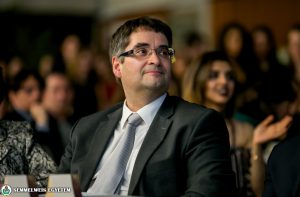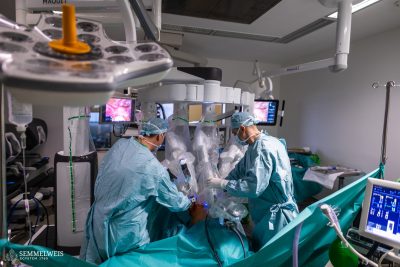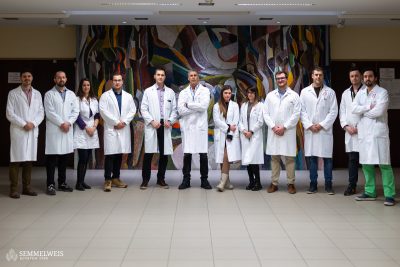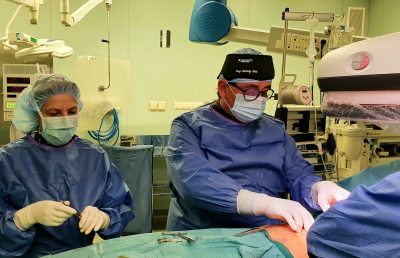Academia Europaea (AE), which associates the most respected European scientists, selected Dr. Attila Mócsai, professor of Department of Physiology of Faculty of Medicine and doctor of MTA (Hungarian Academy of Sciences) among its members. The leader of the Inflammation Physiology Research Group was given this recognition because of his contribution to European scientific life.
The AE was founded in 1988 in Cambridge and has 3,500 members mainly in Europe. The 22 sections of the institute include all areas of science: natural sciences, medicine, life sciences, literature sciences and social sciences. The goals of the institute include the wider popularization of the results of the European research, the support of the interdisciplinary and international research cooperation, the communication of the scientific aspects towards the European decision makers and calling the society’s attention to the usefulness of the research results. Its rank is signified by the fact that 70 of its members have been given the Nobel Prize.
 Dr. Attila Mócsai graduated at Semmelweis University as a general practitioner in 1993 and started his PhD-training in the Department of Physiology under the supervision of professor Erzsébet Ligeti. He received the scientific degree in 1999 and after that spent 3 years as a postdoctoral in one of the most respected medical universities of the USA, the University of California, San Francisco. After arriving back in Hungary, he founded his own work team in the Department of Physiology. With his colleagues, he analyses the mechanism of the emergence of inflammatory diseases and they are working on the identification of new medicine development targets. The research group, which was given the Hungarian grant called “Lendület” Programme (Momentum Programme of the Hungarian Academy of Sciences) in 2013, is trying to identify which intracellular and cell-level processes the immune cells, which contribute to inflammatory diseases, take part in the emergence and subsistence of the disease.
Dr. Attila Mócsai graduated at Semmelweis University as a general practitioner in 1993 and started his PhD-training in the Department of Physiology under the supervision of professor Erzsébet Ligeti. He received the scientific degree in 1999 and after that spent 3 years as a postdoctoral in one of the most respected medical universities of the USA, the University of California, San Francisco. After arriving back in Hungary, he founded his own work team in the Department of Physiology. With his colleagues, he analyses the mechanism of the emergence of inflammatory diseases and they are working on the identification of new medicine development targets. The research group, which was given the Hungarian grant called “Lendület” Programme (Momentum Programme of the Hungarian Academy of Sciences) in 2013, is trying to identify which intracellular and cell-level processes the immune cells, which contribute to inflammatory diseases, take part in the emergence and subsistence of the disease.
Inflammatory diseases pose a serious burden on society; however, their formation is not well-known, which hinders the development of new therapies. In his research, professor Mócsai investigated the animal model of a number of diseases, including rheumatoid arthritis and several skin diseases, trying to find out how the so-called innate branch of the immune system contributes to the formation of inflammatory diseases.
Dr. Attila Mócsai mentioned among the workgroup’s further plans that they could extend their investigations to human samples with the assistance of rheumatologists. He added that last autumn, the largest European-level collaboration of rheumatic disease research was established with the participation of Semmelweis University. The five-year project called Rheuma Tolerance for Cure (RTCure) is designed to detect and treat rheumatic diseases as early as possible and to undertake related preclinical and clinical research. A total of 20 academic and industrial partners, including six multinational pharmaceutical companies actively taking part in the development of rheumatic disease therapy, are involved in the work. From Central-Eastern Europe, only Semmelweis University has been included in the consortium. The professional management of the Hungarian part of the project was carried out with the assistance of Dr. György Nagy, associate professor at the Departmental Group of Rheumatology of the 3rd Department of Internal Medicine and at the Department of Genetics, Cell- and Immunobiology. During the project, researchers of the university study the role of innate immune cells and intracellular signalling processes in the early stages of rheumatoid arthritis.
Zsófia Haszon
Photo: Attila Kovács – Semmelweis University
Translation: Diána Módos, Edina Szendreiné Nagy


